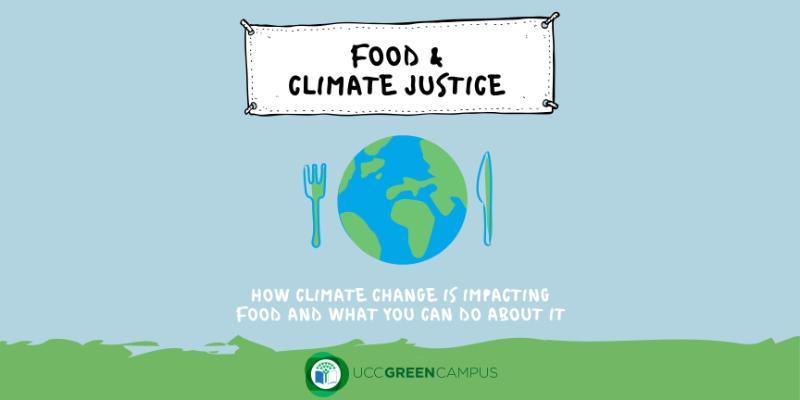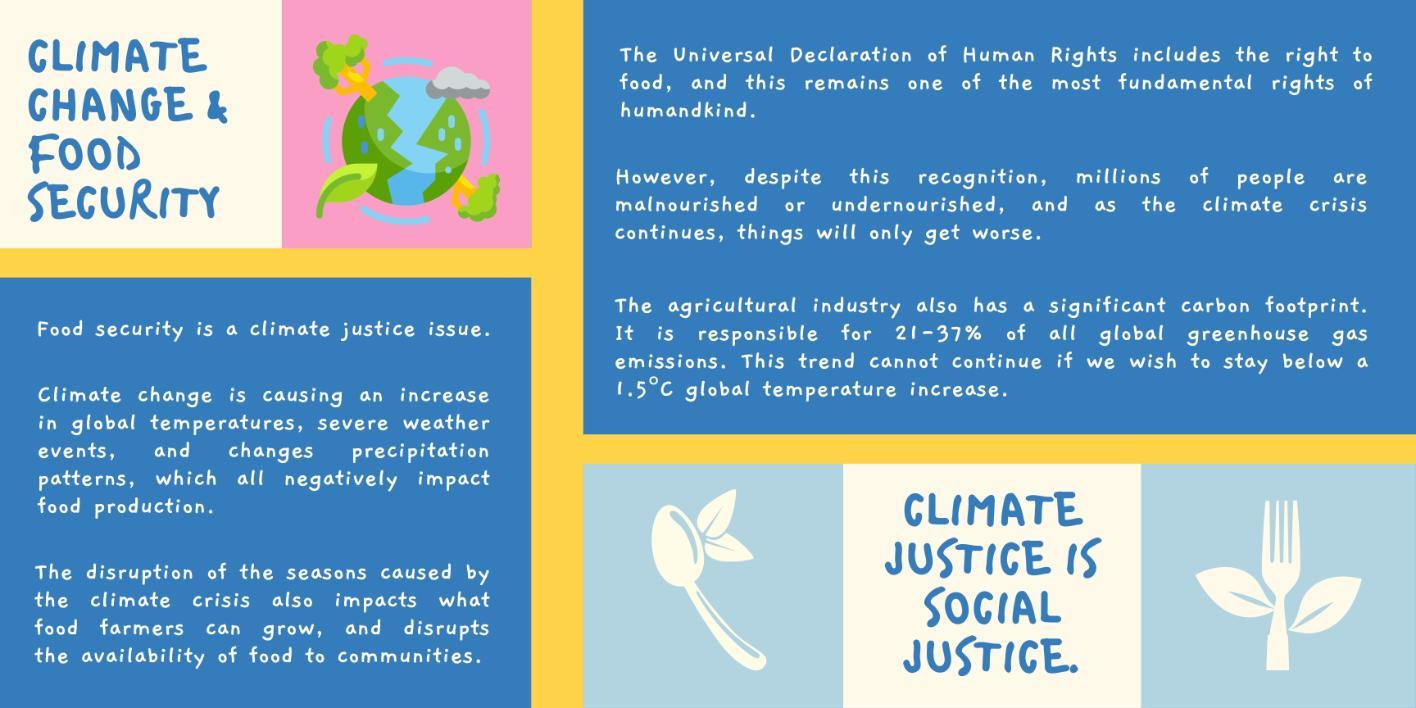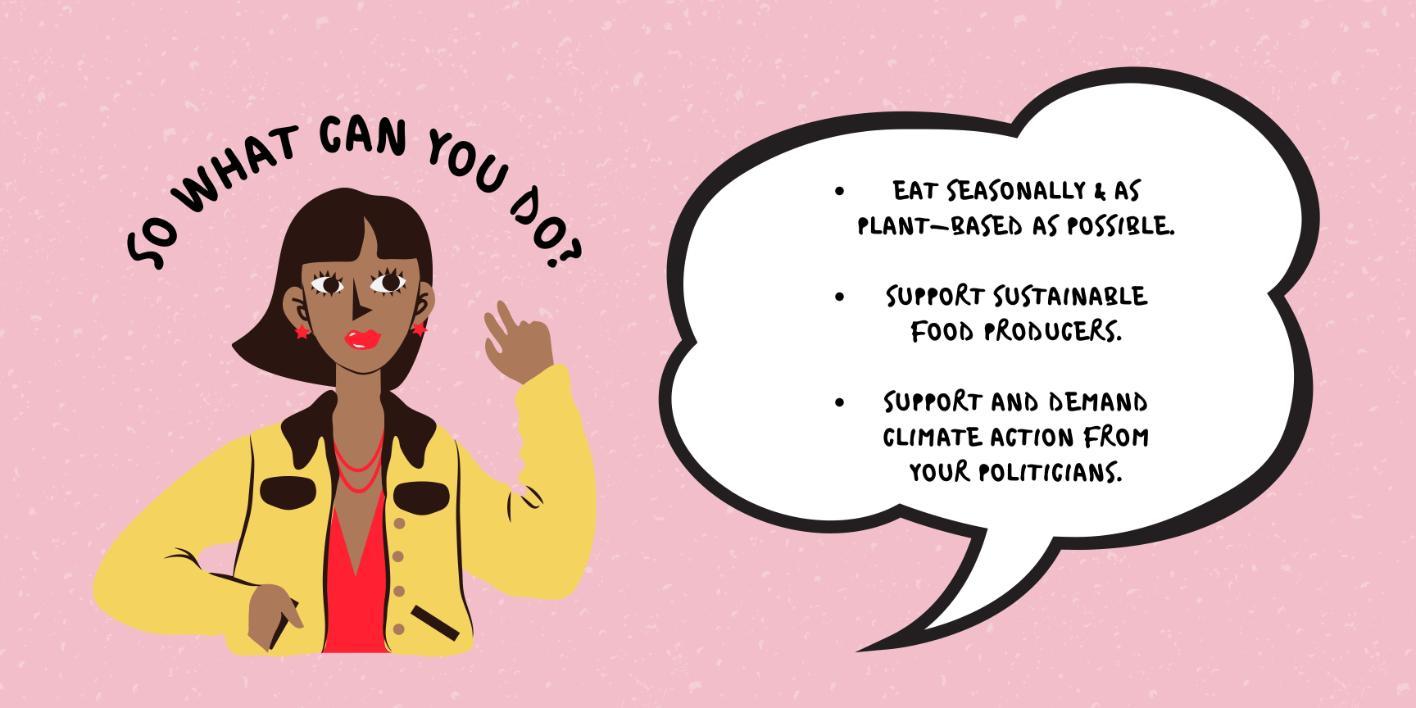- Home
- About
- Student Led
- Research Informed
- Practice Focused
- Resources
- News
- Green Campus Podcasts
- Case Studies
- Green Labs Community
News
Food & Climate Justice

The first climate justice topic that we’re going to delve into is food. Yes, believe it or not, food is a climate justice issue. Food security and climate change are inherently linked, and therefore, environmental degradation and social justice issues are linked.
Greenhouse gas emissions have increased global temperatures, changed precipitation patterns, and increased the frequency of some extreme weather events[1]. While in some areas of the world an increase in temperatures may increase crop yields, overall, the climate crisis will reduce food production, the nutrient quality of food, and increase food prices[2]. On top of that, climate change is harming our ecosystems and pollinators, both of which are essential in agriculture and food production.
Climate change is not a future problem. The climate crisis has already begun affecting the four pillars of food security:
- Availability of food
- Access to food (yield and production)
- Utilisation (prices and ability to obtain food)
- Stability (disruptions to food chains and availability)
Climate change is also making the seasons more unpredictable, which impacts what food farmers can grow and threatens their livelihoods. As a direct consequence, a decreased availability of food means that people are struggling to feed themselves and their families.
Food security is undeniably a human rights issue that requires urgent action. The Universal Declaration of Human Rights includes the right to food in its text[3], and this remains one of the most basic rights of humankind. However, despite the international recognition of this right, millions of people still don’t have access to stable food supplies and they are suffering from malnutrition and undernutrition as a result.
As the climate crisis continues, this will only get worse. According to the IPCC, climate change will particularly impact food security in low-income countries in Africa, Asia, Latin America and the Caribbean[4]. One of the Sustainable Development Goals (SDGs) is to have Zero Hunger by 2030, and we are currently not on track to meet this target. Global greenhouse gas emissions need to be reduced drastically if we want to end world hunger and protect this fundamental human right.
However, modern food production is not only being impacted by climate change, it’s also contributing to the problem. The agricultural industry itself has a significant carbon footprint. Between 21-37% of all greenhouse gas emissions originate from the agricultural industry[5], and these emission trends cannot continue if we want to stay below a 1.5°C global temperature increase[6].
The entire agricultural industry must shift to a sustainable model that works with the environment, instead of against it. We must also ensure a just transition for all farmers, workers in the agricultural sector, and rural communities[7]. Climate justice protects both our environment and our people and it’s essential that governments develop a comprehensive just transition plan to protect both our food supplies and suppliers. Therefore, to tackle this issue, we need unified international action and effective environmental policy.

While political and systemic changes are needed, there are some actions you can take as an individual in your everyday life that will contribute towards creating a sustainable and equitable future for all.
- Eat seasonally and as plant-based as possible.
Some dietary choices, namely animal-based foods, are more resource-intensive and have more severe environmental impacts than others. For example, beef and lamb have the highest greenhouse gas emissions per kilogram of food product. In comparison, plant-based foods such as beans, lentils, and peas have a much smaller environmental impact[1]. While it’s not realistic or possible to expect everyone to go 100% vegetarian or vegan, reducing the amount of meat/dairy/eggs you consume on a day-to-day basis will drastically reduce your carbon footprint.
Eating seasonally is also a great way to lower your environmental impact. Essentially, this means that you eat with the seasons, eating what fruit and vegetables that are being grown in your local area right now. This will not only save you money, as consuming foods out of season are typically more expensive, but it will reduce the emissions associated with your food.
- Support sustainable food producers
Supporting farmers and food producers in your area who engage in sustainable farming practices is a great way to support local businesses and make the most environmentally friendly choice you can.
- Support and demand climate action
The climate crisis is the greatest threat humankind has ever faced[2] and a reduction in global greenhouse gas emissions will safeguard farmers' livelihoods and protect our food supplies. For this to happen, we need political action, both nationally and internationally. No climate justice issue can be solved by one person. We need meaningful, collective action on all levels of society to tackle and solve this issue.
Get involved in local and national environmental groups and lobby your political representatives. We must put pressure on our government to take stronger actions in mitigating the climate crisis and it's imperative that the Irish government supports climate adaptation initiatives that will safeguard our food supplies and stop millions of people going hungry.
Climate change is not solely an environmental issue. It is a political, economic, and social problem that must be examined and solved using an intersectional lens to protect those who are most vulnerable to its impacts.

[1] Our World in Data, “Greenhouse gas emissions per kilogram of food product” https://ourworldindata.org/environmental-impacts-of-food
[2] United Nations, “Climate Change ‘Biggest Threat Modern Humans Have Ever Faced’, World-Renowned Naturalist Tells Security Council, Calls for Greater Global Cooperation” https://www.un.org/press/en/2021/sc14445.doc.htm
1] C. Mbow, et al. Food Security: An IPCC special report on climate change, desertification, land degradation, sustainable land management, food security, and greenhouse gas fluxes in terrestrial ecosystems (439) https://www.ipcc.ch/site/assets/uploads/sites/4/2021/02/08_Chapter-5_3.pdf
[2] Food and Climate Change https://www.foodsystemprimer.org/food-production/food-and-climate-change/
[3] Universal Declaration of Human Rights Article 25.
[4] IPCC Press Release 2019 https://www.ipcc.ch/site/assets/uploads/2019/08/Pr_SRCCL.pdf
[5] C. Mbow, et al. Food Security: An IPCC special report on climate change, desertification, land degradation, sustainable land management, food security, and greenhouse gas fluxes in terrestrial ecosystems (439) https://www.ipcc.ch/site/assets/uploads/sites/4/2021/02/08_Chapter-5_3.pdf
[6] See IPCC Special Report, ‘Global Warming of 1.5°C https://www.ipcc.ch/sr15/
[7] Action Aid “Climate Justice in the Food System” https://www.actionaidusa.org/blog/climate-justice-and-agriculture/
For Further Reading:
Ferguson, R., “Why We Can’t Separate Justice and Sustainability in the Food System” https://blog.ucsusa.org/rafter-ferguson/why-we-cant-separate-justice-and-sustainability-in-the-food-system/
Gonzalez, C., “Food Justice: An Environmental Justice Critique of the Global Food System” (2015) http://dx.doi.org/10.1017/CBO9781107295414.020
Ranganathan, J., and Waite, R., “Sustainable Diets: What You Need to Know in 12 Charts” https://www.wri.org/insights/sustainable-diets-what-you-need-know-12-charts
Simmons, D.,“A brief guide to the impacts of climate change on food production” https://yaleclimateconnections.org/2019/09/a-brief-guide-to-the-impacts-of-climate-change-on-food-production/
[1] United Nations, “Climate Change ‘Biggest Threat Modern Humans Have Ever Faced’, World-Renowned Naturalist Tells Security Council, Calls for Greater Global Cooperation” https://www.un.org/press/en/2021/sc14445.doc.htm
